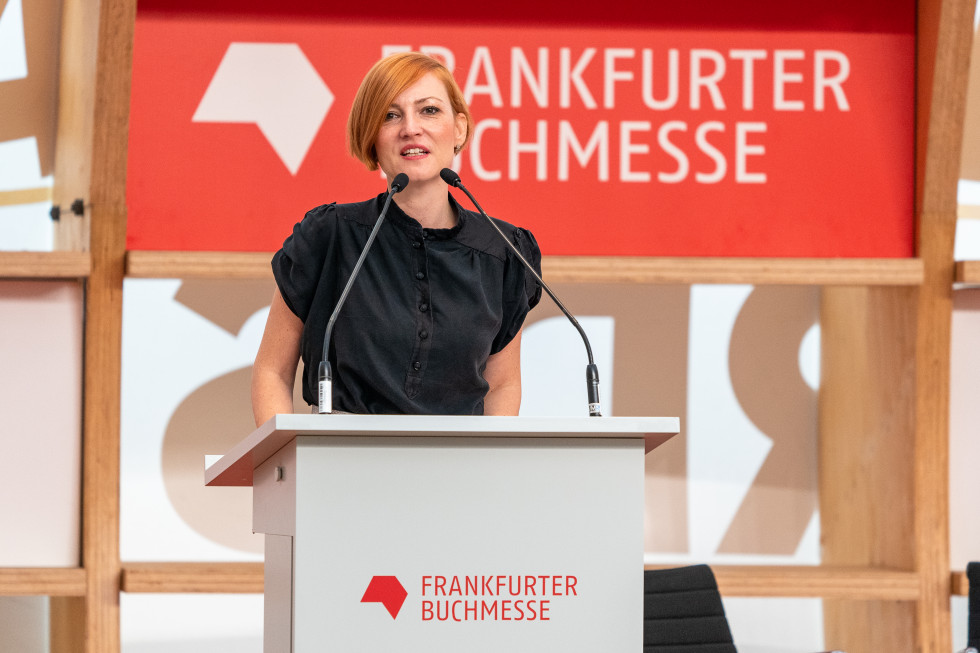Slovenia officially declared a Guest of Honour at the 2023 Frankfurt Book Fair

Minister of Culture dr. Asta Vrečko at the official announcement of Slovenia as guests of honor at the Frankfurt Book Fair | Author Holger Menzel/Javna agencija za knjigo
In addition to the Minister, the press conference was also attended by Juergen Boos, the President and CEO of Frankfurt Book Fair, and Dr Miha Kovač, the co-curator of Slovenia’s presentation at the Frankfurt Book Fair.
According to Minister Vrečko, the Frankfurt Book Fair is much more than just a fair of publishers and authors. It is a dialogue and a meeting place of various ideas and views. As the Guest of Honour in 2023, Slovenia will, by showcasing its cultural diversity, invite the national and international public to engage in a dialogue with Slovenian culture and art. It was written in the brochure for Slovenia’s candidacy as the Guest of Honour in 2015 that, "Slovenia is a small country, but the lovers of culture should place it on the list of destinations that must be seen, tasted and felt." As highlighted by the Minister, Slovenia is considered a creative hub of Central and South-Eastern Europe, with numerous festivals, such as the Vilenica International Literary Festival that has hosted an array of renowned authors since 1986, some of whom later became Nobel laureates. Slovenia is not only exceptional in publishing, but its cultural activities are very vibrant and diverse in all fields of art.
As noted by the Minister, art and culture teach us to hear ourselves and each other and they thus contribute greatly to the development and spread of a more tolerant and mutually supportive dialogue on the pressing issues of modern times. "High-quality artistic contents enrich us, open our horizons, enable us to develop critical thinking, and encourage our imagination. Through books, we encounter and visit different worlds, understand them better, learn to respect diversity, equal opportunities, empathy and openness towards others and acceptance of ourselves." The Ministry of Culture together with the Slovenian Book Agency, cultural institutions involved in books and reading culture and a well-developed national network of general libraries encourages reading and reading literacy of various target groups, especially among children and young people.
Dr Miha Kovač, the co-curator of Slovenia’s presentation, initially introduced the themes that will be at the forefront of Slovenia’s presentation, i.e. the innovation and creativity of small publishers, the importance of reading books in the era of screens and European linguistic diversity. According to Kovač, Slovenian book production reflects European diversity but is also unique and original. On that note, he highlighted that more than 600 translations of Slovenian literary works into various languages were published in the last three years alone, which is truly a large number for a community of two-million people. Kovač further added, "Numerous dramatists, poets, journalists, teachers, priests and everyone writing and speaking Slovenian have spun their language into a unique coat of words. And this is one of the reasons that we can celebrate Slovenian books and speak Slovenian today on this stage. Although small, this coat never became too tight. It is donned amidst a rich confluence of influences and a small number of speakers. Indeed, Slovenian intellectuals have traditionally been multilingual, with many of them also writing in at least one other language. From here springs our enthusiasm for the honeycomb of words. Just like honeybees go into the world to return home with a drop of nectar and a grain of pollen, Slovenian language and culture have been inspired by various cultural, artistic, linguistic and ideological influences through numerous translations and with the help of authors who left Slovenia and went into the world or those who came to Slovenia from elsewhere. The authors writing in Slovenian transposed these influences into a diverse, yet unique and dynamic language, in which it is possible to write love sonnets, crime stories and hermetic novels, or discuss quantum mechanics and psychoanalysis. In the words of Slovenian poet Srečko Kosovel, `I would like to walk around in a small coat of words. But hidden underneath should be a warm, bright world.`"
Within the framework of the press conference, a discussion with Slovenian authors Peter Svetina, Nataša Kramberger and Ana Marwan, and Slovenian-to-German translator Erwin Köstler took place, moderated by German journalist and literary critic Katja Gasser.

